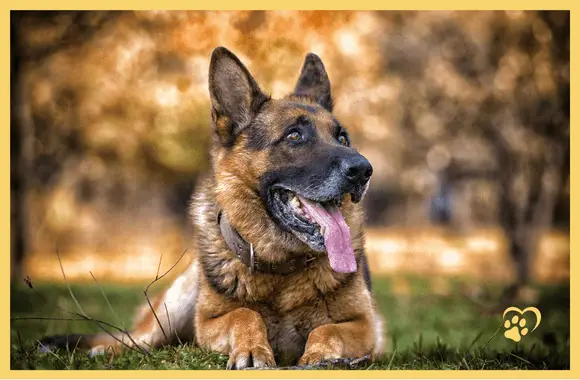Sheepdogs are true multi-talents who inspire us with their intelligence, loyalty and love of work. But even these heroes on four paws are unfortunately not spared from health problems. In our health guide for German shepherds, you will learn everything you need to know about common diseases and how you can effectively prevent them.
We take you by the hand and guide you step by step through the world of sheepdog health - without any technical jargon. Learn how you can give your four-legged friend a long, healthy and happy life - so that you and your sheepdog can spend many wonderful years together.
Shepherd dog hip dysplasia: what you need to know
Definition and causes
Hip dysplasia is one of the most common disorders of the German Shepherd Dog and affects the hip joint. Simply put, it means that the condyle of the femur does not fit properly into the socket of the pelvic bone. This puts uneven stress on the joint, which can lead to pain and inflammation. Genetic factors are usually to blame, but obesity and lack of exercise can also play a role. Don't let your puppy jump too hard, this can also damage the hip joint. By the way, hip dysplasia does not only occur in dogs, but also in humans and other animals - even polar bears are affected!
Symptoms and diagnosis
The signs of hip dysplasia can be varied. Often, the condition is noticeable through lameness, limited mobility, or pain when standing up. Some German Shepherds also have difficulty climbing stairs or jump reluctantly. If you notice such behavioral changes in your four-legged friend, you should not hesitate to consult a veterinarian. He can make an accurate diagnosis with the help of X-rays and determine how badly the hip joint is already damaged. Hip dysplasia can be diagnosed even in puppies. Veterinarians use special examination methods for this purpose in order to initiate suitable treatment at an early stage.
Degenerative Myelopathy in the German Shepherd Dog: Causes, Symptoms and Diagnosis
Definition and cause
Degenerative myelopathy is a progressive disease of the spinal cord that occurs mainly in German Shepherds and some other breeds of dogs. It affects the central nervous system and causes progressive degeneration of the nerve cells. The exact causes are not yet fully understood, but there is evidence that genetic factors play a role. Interestingly, a link has been established with a similar disease in humans, amyotrophic lateral sclerosis (ALS), which is driving research in this area.
Symptoms and diagnosis
The first signs of degenerative myelopathy are usually manifested by gradual weakness of the hind legs, which worsens over time. Affected dogs often have difficulty walking, cannot set their paws properly, and stumble frequently. In advanced stages, incontinence and paralysis may occur. Unfortunately, there is currently no cure for this disease, but early diagnosis is important to slow the progression of the disease as much as possible and allow your dog to live as comfortably as possible.
Because the symptoms of degenerative myelopathy can resemble those of other neurological or orthopedic problems, it is important to see your veterinarian to make an accurate diagnosis. To that end, the veterinarian will usually perform neurological exams and, in some cases, may recommend genetic testing to better assess the risk of the disease. Did you know that there are also preventive genetic tests for German Shepherds? These can help reduce the risk of degenerative myelopathy in future generations.

Allergies and skin problems in sheepdogs: Causes, symptoms and therapeutic approaches
Triggers and typical symptoms
Herding dogs can also suffer from allergies and skin problems, whereby the triggers can be manifold. Common causes are environmental allergens such as pollen, dust mites or mold spores, but food allergies or reactions to flea and tick bites are also not uncommon. Symptoms can range from itching, redness, scaling to hair loss and inflamed skin. Some dogs even develop what are called "hot spots" - severely inflamed and oozing areas of skin that can be very painful. Some dogs are even allergic to human hair. Fortunately, this is rather rare!
Treatment options
The right treatment depends, of course, on the cause of the allergy or skin problem. In the case of environmental allergies, it can help to avoid contact with the triggering allergens as much as possible, for example by regularly vacuuming or changing the bed linen. In the case of food allergies, it is important to find out the exact cause in order to adjust the diet accordingly. This can be achieved by a so-called elimination diet, in which various food components are gradually tested.
Medications such as antihistamines or preparations containing cortisone can be used to relieve the symptoms. For dogs with sensitive skin, there are special care products that relieve itching and soothe the skin. For severe skin inflammation or infection, be sure to consult a veterinarian who can prescribe antibiotic or anti-inflammatory therapies if necessary. Most importantly, be patient, as treating allergies and skin problems can be a lengthy process. But with the right therapy and care, your German Shepherd is sure to be healthy and lively again soon!
Gastric torsion in German Shepherds: How to recognize and act on the dangerous disease
Definition and causes
Gastric torsion, also called torsio ventriculi, is a life-threatening condition in which the dog's stomach rotates on its axis, cutting off the blood supply. This can cause rapid deterioration of the general condition and can be fatal without immediate treatment. Large dog breeds such as German shepherds are particularly at risk, but other factors such as genetic predisposition, stress, or improper feeding habits can also play a role. Scientists have found that dogs with a deep and narrow chest are more prone to gastric torsion than dogs with a wide chest.
Symptoms and treatment
Gastric distention is manifested by sudden symptoms such as severe agitation, unsuccessful vomiting or retching, distended abdomen, excessive salivation and pain. If you notice such signs in your German Shepherd, you should seek immediate veterinary attention, because every minute counts!
Treatment initially consists of reducing the pressure in the stomach, which in some cases can be achieved by inserting a tube. In most cases, however, emergency surgery is necessary to return the stomach to its proper position and restore blood supply. After surgery, the veterinarian may recommend securing the stomach to the abdominal wall to prevent future gastric torsion.
To minimize the risk of gastric distress, feed your German Shepherd several times a day in small portions, avoid stressful situations, and give him plenty of rest after eating.

Preventive measures against diseases in the sheepdog: How to keep your four-legged friend fit and healthy
Regular visits to the vet
Regular vet visits are important for your German Shepherd's health. Young dogs should be examined at least once a year, older dogs every six months from the age of seven. This way, possible problems can be detected and treated at an early stage.
During preventive examinations, the veterinarian should check the dog's weight and general condition, examine the teeth and perform a blood test. In addition, regular vaccinations and parasite prophylaxis are important to prevent diseases.
Proper nutrition
A balanced diet is important for the health of your sheepdog. Make sure that the food contains all the essential nutrients, vitamins and minerals that your dog needs. High quality dog food is especially recommended.
Feed your dog several times a day in small portions to avoid overloading the stomach. Make sure your dog gets enough rest after eating and avoid physical exertion immediately after eating.
Activity and movement
The German Shepherd is an active dog that needs a lot of exercise. Long walks, games of fetch or agility training can help keep your dog physically fit.
In addition to physical exercise, mental exercise is also important. Intelligence games, nose work or obedience training can help keep your German Shepherd mentally fit.
Recognize symptoms early: stay alert and act quickly
What signs should you look for?
Keeping a watchful eye on your German Shepherd is important to detect health problems early. Watch for changes in behavior, eating patterns or physical condition. Typical warning signs include lethargy, weight loss, itching or breathing difficulties. Sheepdogs often try to hide pain or discomfort. That's why it's especially important to look closely.
When to see a veterinarian
As soon as you notice signs of health problems, you should not hesitate to see a veterinarian. Early diagnosis and treatment can be crucial to maintaining your German Shepherd's long-term health. Remember that seemingly harmless symptoms can hide serious illnesses. It is better to visit the vet once too often than once too little!
Conclusion: How to keep your sheepdog healthy and lively
Sheepdogs are susceptible to some health problems, but you can minimize the risk with proper care and attention and help your dog live a long and happy life. Regular vet visits, a balanced diet, adequate exercise and recognizing symptoms are key to your German Shepherd's health.
Now it's your turn: show your faithful companion how much you care for him and enjoy many carefree years together!
